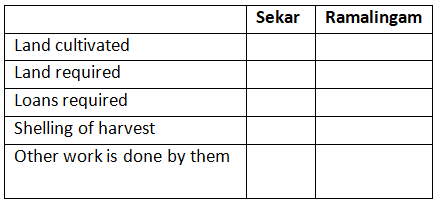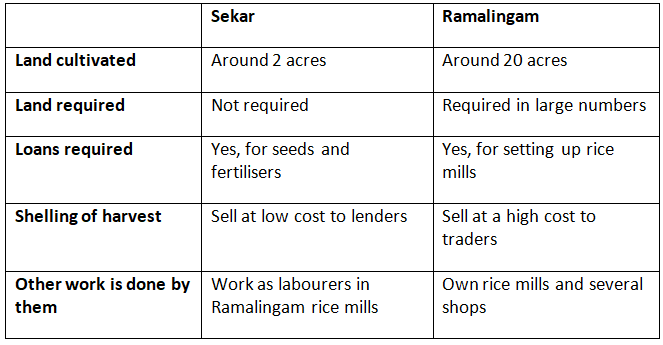NCERT Solutions for Class 6 Civics - Rural Livelihoods
Q1. You have probably noticed that people in Kalpattu are engaged in a variety of non-farm work. List five of these.
Ans: Five non-farm work of people in Kalpattu village:
(i) Making baskets, utensils, pots, bricks, bullock-carts etc.
(ii) Blacksmiths
(iii) Nursing
(iv) Teaching
(v) Shop-keeping
(vi) Trading
Q2. List the different types of people you read about in Kalpattu who depend on farming. Who is the poorest among them and why?
Ans: Different types of people who depend on farming are:
(i) Big landowner
(ii) Small landowners or Farmers
(iii) Landless farmers or Labourers
Landless farmers or labourers are the poorest among them because they have seasonal earning. They always have to look for work at other places after the harvesting period is over and also paid very less. They do not have fixed income and sometimes they go without work. Hence, Thulasi is the poorest.
Q3. Imagine you are a member of a fishing family and you are discussing whether to take a loan from the bank for an engine. What would you say?
Ans: If I were a member of a fishing family then I must have taken loan from the bank for an engine to improve and to invest in the growth of the business. The engine is very costly and bank is a trusted institution from where we can borrow money. They have fixed terms and rates. They will not ask for shares in our profit and are reliable. Moreover, buying an engine will increase the income.
Q4. Poor rural labourers like Thulasi often do not have access to good medical facilities, good schools, and other resources. You have read about inequality in the first unit of this text. The difference between her and Ramalingam is one of inequality. Do you think this is a fair situation? What do you think can be done? Discuss in class.
Ans: The situation is not fair according to the Indian Constitution, which guarantees equality in access to facilities for everyone. However, there are many factors that affect access to good medical care, schools, and other resources. Some people may work hard and earn enough to afford better facilities, while others cannot. It is the government’s responsibility to ensure that every citizen has access to basic services, regardless of their income. The government can help by offering loans for work, farming land, affordable fertilizers and seeds, and setting up hospitals to support those in need.
Q5. What do you think the government can do to help farmers like Sekar when they get into debt? Discuss.
Ans: The government can do following things to help farmers like Sekar when they get into debt:
(i) Provision of easy farming loans from the banks at low rate of interest.
(ii) Insurance of their cultivation.
(iii) Provision of subsidised fertilizers, pesticides and HYV seeds.
(iv) Farming schools and help should be provided at no cost.
Q6. Compare the situation of Sekar and Ramalingam by filling out the following table:
Ans:
|
69 videos|386 docs|80 tests
|
FAQs on NCERT Solutions for Class 6 Civics - Rural Livelihoods
| 1. What are rural livelihoods? |  |
| 2. How do rural livelihoods contribute to the economy? |  |
| 3. What are the challenges faced by rural livelihoods? |  |
| 4. How can government initiatives support rural livelihoods? |  |
| 5. What is the importance of sustainable rural livelihoods? |  |



















